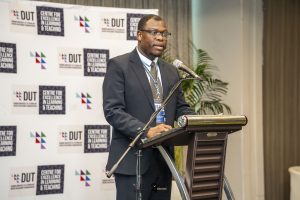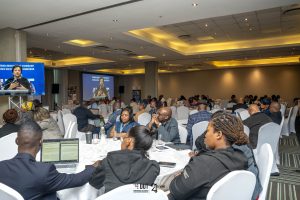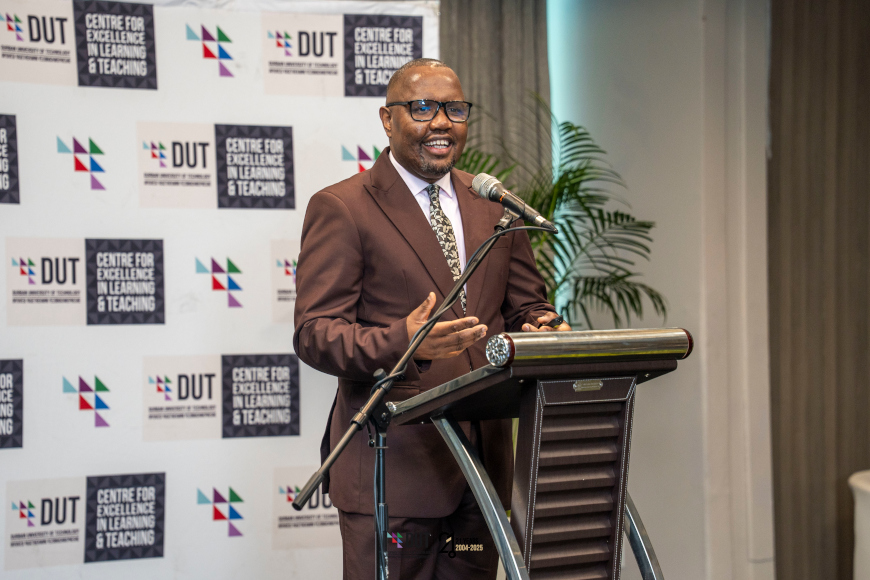With a focus on innovation, entrepreneurship, collaboration, and social impact, the Learning, Teaching, Research, Innovation and Engagement (LTRIE) Conference was officially opened at Coastlands Umhlanga today, 27th October 2025.
The three-day LTRIE Conference will conclude on 30th October 2025. The Centre for Excellence in Learning and Teaching (CELT), Research and Postgraduate Support, Technology Transfer and Innovation (TTI) and the DUT-led UCDP collaborative project (Doctoral Communities of Scholarship) excitedly launched the first combined Learning, Teaching, Research, Innovation and Engagement (LTRIE) Conference to foster critical discussions and forward-thinking approaches that contribute to shaping the future of higher education in Africa and beyond.
It further aims to serve as a critical space for scholars, researchers, practitioners, students and community partners to engage deeply with transformative educational practices and innovations that respond to glocal challenges.
Acting Director: Centre for Excellence in Learning and Teaching (CELT), Dr Shoba Rathilal conveyed a warm welcome to all delegates to the Annual Teaching, Research, Innovation, and Engagement Conference.
“We are honoured to have a distinguished lineup of keynote speakers and lead talk presenters who will share their expertise and vision that promise to disrupt and inspire us. The response to this call has been truly inspiring. We have been overwhelmed by the richness and variety of the submissions received. From rigorous academic papers and interactive workshops to thought-provoking creative arts performances and exhibitions, you have demonstrated a profound engagement with the complex questions before us. This diversity of expression is a powerful testament to the multifaceted nature of our inquiry and the vibrant intellectual and creative life of our community,” she said.
According to Dr Rathilal, this conference has placed great emphasis on fostering the critical conversations and collaborations needed to build an academy that is not only innovative but also deeply connected to the societies served.
“We look forward to the challenging and inspiring dialogues that will undoubtedly emerge over the next few days as we work together to envision and enact the future of higher education,” indicated Dr Rathilal.
 Sharing her sentiments was Professor Vusi Gumede, Deputy Vice-Chancellor: Teaching and Learning, who looked forward to an insightful discussion, debates and analyses.
Sharing her sentiments was Professor Vusi Gumede, Deputy Vice-Chancellor: Teaching and Learning, who looked forward to an insightful discussion, debates and analyses.
“Let us all participate actively and productively. The issues that the conference deals with are very important, undoubtedly. The future of our enterprise depends on us, sharpening the discourse, ideas, perspectives and policies that would ensure that higher education in South Africa thrives and serves its primary purpose. This year’s conference is building on the legacy of the Learning and Teaching imbizo and the Research, Innovation and Engagement indaba,” he said.
Professor Emmanuel Mgqwashu from the University of KwaZulu Natal then delved into his keynote address titled: Research-Led Community Engagement for Enhancing Innovation in Teaching and Learning.
“Scholarship on higher education teaching and learning, particularly in decolonising contexts such as South Africa, has constantly emphasised the need for academics as university teachers to engage in a continual and systematic inquiry into student learning,” he said.
He argued in his presentation that a shift from viewing communities outside universities as needing ‘help’ from higher education knowers has to occur. He further illustrated that the intellectual, entrepreneurial and practical value in this shift, and how the integration of civic engagement into teaching and learning, research and service, can strengthen university translational research.
Delving further into the discussion on generating practical solutions to societal challenges was Prof Michael Twum-Darko who is from the Cape Peninsula University of Technology. His dynamic presentation focused on entreprenetics, looking at transforming research and innovation for commercialisation. He shared that despite decades of entrepreneurship education, outcomes remain disappointing with fewer than one in 15 graduates becoming entrepreneurs.
“Entrepreneurship majors often opt for traditional jobs because most programmes teach about entrepreneurship rather than cultivating entrepreneurs. We produce business plans, not business builders. We emphasise theories, not self-discovery. There is little relationship between innovation and entrepreneurship,” he said.
Prof Twum-Darko spoke on the dire need to shift research from theory to applied societal impact. After his riveting academic talk, this was followed by an innovative presentation delivered by Prof Nyna Amin from the University of KwaZulu-Natal. Her academic talk looked at innovation at the nexus where learning, research and engagement meet.
 After the delivery of the dynamic presentations by the various keynote speakers for the day, critical dialogues were embarked on whereby topics of discussions pertained to research for social transformation with an in- depth look into integrating systems thinking in critical transdisciplinary conversations. Further on some of the other conversations that were embarked on related to developing future-ready professionals, integrating Artificial Intelligence (AI) and peer support for equitable student success, as well as analysing the role of peer mentors in supporting the academic adjustment through first-year student experience (FYSE) programme.
After the delivery of the dynamic presentations by the various keynote speakers for the day, critical dialogues were embarked on whereby topics of discussions pertained to research for social transformation with an in- depth look into integrating systems thinking in critical transdisciplinary conversations. Further on some of the other conversations that were embarked on related to developing future-ready professionals, integrating Artificial Intelligence (AI) and peer support for equitable student success, as well as analysing the role of peer mentors in supporting the academic adjustment through first-year student experience (FYSE) programme.
The first day of the LTRIE Conference concluded with a welcome cocktail dinner where Dr Rathilal took the opportunity to welcome everybody in attendance, also acknowledging the delegates for their vital roles in exploring the dynamic intersections between pedagogy, knowledge production, transformative research, innovation and entrepreneurship.
Pictured: Professor Emmanuel Mgqwashu from the University of KwaZulu Natal delivering his keynote address at the LTRIE Conference.
Waheeda Peters

